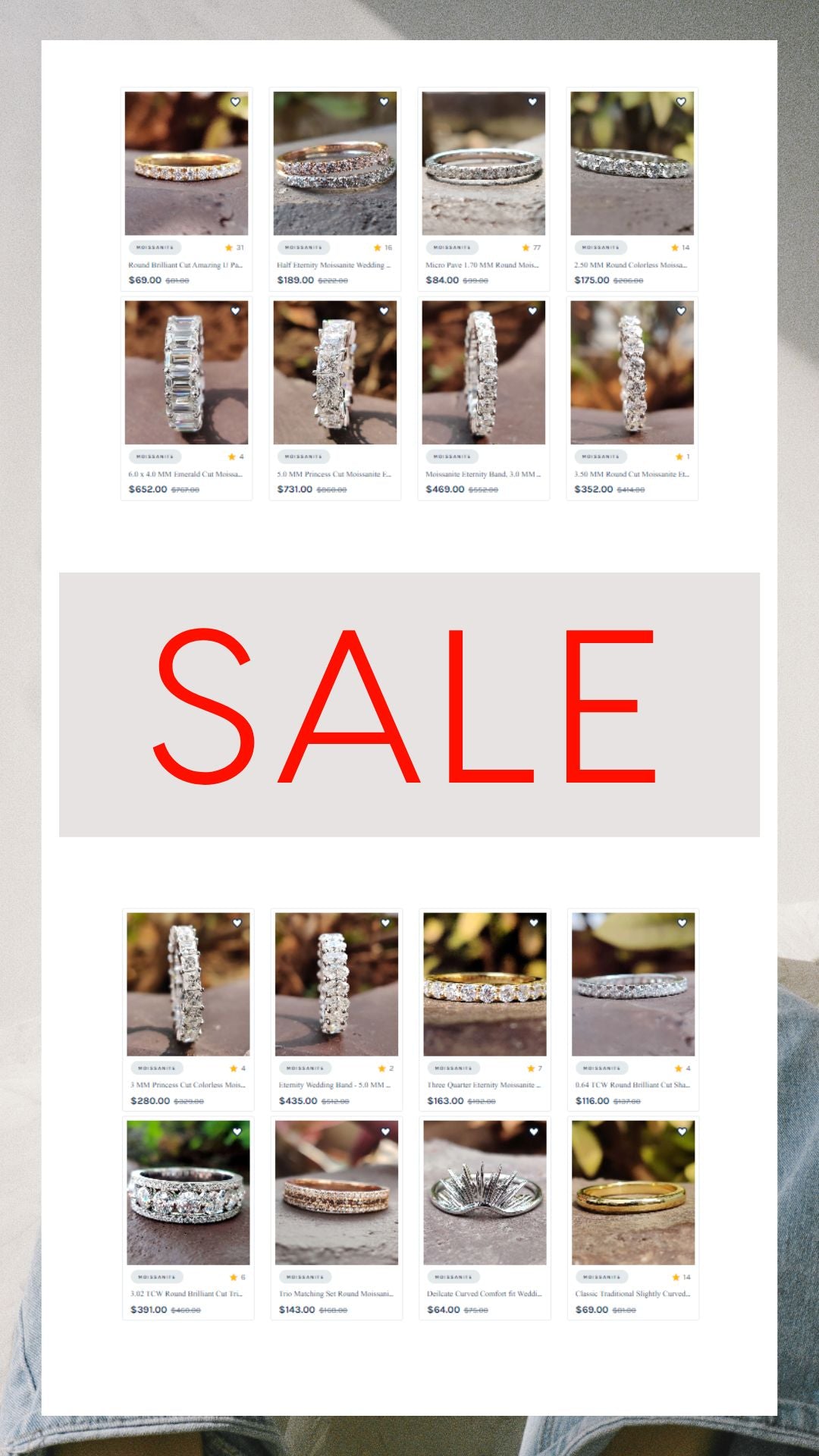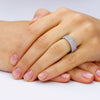
Best Wedding Band Metals: Durability Meets Style
When choosing a wedding band, the metal you select is as significant as the design. Your wedding band is not only a symbol of your commitment but also an accessory you'll wear daily. Different metals can convey varied aesthetics, offer distinct durability levels, and come with their own price points to consider. It's essential to find a balance between personal style, practicality, and cost.
Table Of Contents
- Understanding Wedding Band Metals
- Popular Wedding Band Metals
- Selection Criteria for Wedding Bands
- Metal Quality and Composition
- Design Elements and Customization
- Wear and Maintenance of Wedding Bands
- Advantages and Drawbacks of Each Metal
- Special Considerations for Men's Wedding Bands
- Unique and Novel Metals
- Jeweler and Purchasing Advice
- Frequently Asked Questions
As you navigate your options, you'll encounter traditional metals such as gold, which has been a cornerstone in wedding jewelry for centuries due to its timeless appeal and the variety of colors it offers, from yellow to white to rose. On the more contemporary end, platinum stands out for its strength and durability, often chosen for its heft and resistance to wear over time. It's hypoallergenic properties make it a suitable option for sensitive skin.
Another worthy contender is titanium, known for its impressive strength-to-weight ratio and modern look. This metal is also hypoallergenic and provides a more budget-friendly alternative than platinum while still ensuring longevity. Your wedding band accompanies you through life's journey; selecting the right metal is paramount in ensuring it remains a lasting token of your love.
Understanding Wedding Band Metals
When selecting your wedding band, it's important to consider the metal's properties, hardness, color, and whether it is hypoallergenic to ensure that it suits your lifestyle and skin type.
Metal Properties
Different metals offer a spectrum of physical and aesthetic characteristics, affecting their suitability for wedding bands. Gold, for example, offers a classic shine and warmth, while platinum is valued for its density and minimal tarnish. Silver, known for its luster, is softer and more prone to scratches. Metals like titanium and tungsten are gaining popularity for their strength and lightweight feel.
Comparing Hardness and Durability
Durability is often a deciding factor in choosing a wedding band. In terms of hardness, tungsten ranks highest on the Mohs scale, resistant to scratches, followed by titanium. Platinum stands out for maintaining its appearance over time, despite being less hard than tungsten. Gold's malleability means it can be prone to dents and scratches but is easier to buff and repair.
Color and Aesthetic Appeal
The color of a metal should complement your skin tone and stylistic preferences. Yellow gold offers a warm hue preferred by traditional tastes, white gold provides a cooler tone, and rose gold stands out with its unique pinkish color. Platinum maintains a natural white sheen without the need for rhodium plating, unlike white gold.
Hypoallergenic Qualities
If you have sensitive skin, hypoallergenic options like platinum or palladium may be the best fit for you as they're less likely to cause skin reactions. While nickel is often mixed with other metals and can cause allergic reactions, opting for high-karat gold, such as 18K or 24K, reduces the risk of irritations, as they contain fewer alloys.
Remember to weigh these elements carefully to find the wedding band metal that aligns with your preferences and lifestyle.
Popular Wedding Band Metals
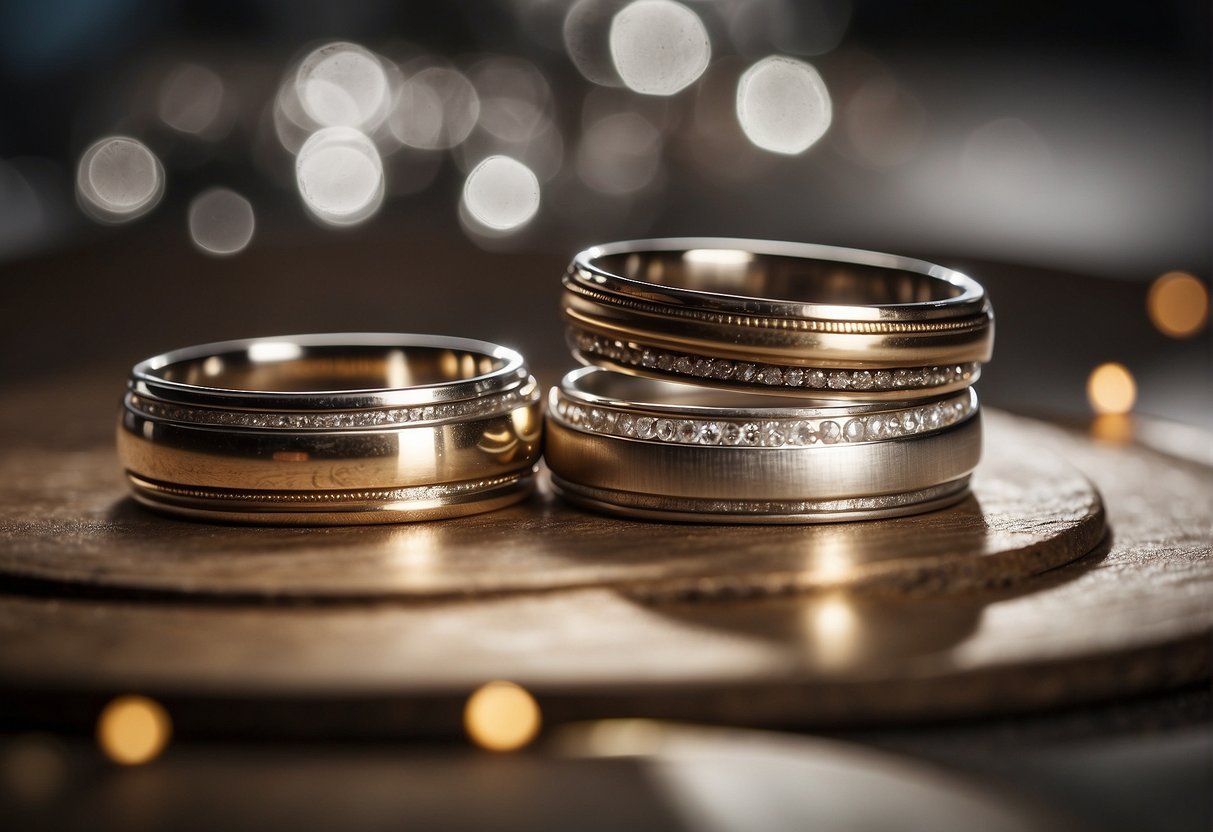
When selecting a wedding band, the type of metal is an important consideration for both style and durability. Here's a guide to the most common metals used in wedding bands, their characteristics, and what makes them appealing.
Gold: Varieties and Purity
Gold has long been the traditional choice for wedding bands. Yellow gold is classic and timeless, while white gold offers a modern twist with its silvery sheen. Rose gold, with its pinkish hue, has gained popularity for its romantic feel. When you're looking at gold, you'll often have to choose between 14k gold and 18k gold; the former is more durable due to the higher percentage of alloyed metals, while the latter has a higher gold content, giving it a richer color.
Silver and Sterling Silver
Silver is a softer metal and is less expensive than gold or platinum, making it an accessible option. Sterling silver, consisting of 92.5% silver, is often used for jewelry because it strikes a balance between malleability and durability. It's a good choice if you're seeking affordability without sacrificing elegance.
Platinum and Palladium
Platinum is a prestigious choice for wedding bands due to its density and rarity, boasting a naturally white sheen that doesn't fade over time. Palladium is a similar metal with a lighter weight and often comes at a lower price point. Both of these metals are hypoallergenic and are suitable if you have sensitive skin.
Contemporary Metals
Metals like tungsten, titanium, and cobalt are modern alternatives known for their strength and unique appearance. Tungsten boasts extreme durability and scratch resistance, making it a practical choice for those with active lifestyles. Titanium is remarkably lightweight and strong, and cobalt has a bright white color similar to white gold or platinum.
Alternative Metal Options
Other metals that are gaining popularity in wedding bands include steel and stainless steel. These metals are durable, corrosion-resistant, and have a sleek, industrial look. They’re a great option if you're looking for something that differs from traditional jewelry metals, often at a more affordable price point.
Selection Criteria for Wedding Bands
| Criterion | Description |
|---|---|
| Metal Type | Choose a metal that complements your lifestyle and preferences, such as gold (yellow, white, rose), platinum, or palladium. |
| Ring Style | Select a style that reflects your personal taste, whether it's classic, modern, vintage, or a unique design that holds sentimental value. |
| Band Width | Determine the width of the band based on your finger size, style preference, and comfort. Options range from narrow to wide bands. |
| Profile | Consider the profile or shape of the ring, such as flat, domed, or beveled edges, to find a comfortable and visually appealing fit. |
| Stone Settings | Decide whether you want a plain band or one with gemstones. Common choices include diamonds, sapphires, or other birthstones. |
| Metal Finish | Choose a finish that complements your style, such as polished, brushed, hammered, or a combination of finishes for added texture. |
| Comfort Fit | Opt for a comfort-fit wedding band that has a rounded interior for a comfortable and secure fit, especially for everyday wear. |
| Engravings | Consider adding personalized engravings, such as names, dates, or meaningful messages, to make the wedding band truly special. |
| Budget | Establish a budget range that aligns with your financial considerations, including the metal choice, design complexity, and any added features. |
| Maintenance | Understand the maintenance requirements of the chosen metal and design to ensure longevity and lasting beauty of the wedding band. |
| Matching Sets | For couples, consider matching wedding bands that complement each other in design, metal, or other significant elements. |
When selecting the perfect wedding band, it's important to consider factors such as how the band feels on your finger, if it suits your day-to-day activities, the amount of maintenance it will require, and the cost. Each aspect contributes to your ultimate satisfaction with the band you choose.
Comfort and Weight Considerations
Your wedding band should feel like a natural extension of your finger. Metals like titanium and tungsten are incredibly durable yet surprisingly lightweight, offering a comfortable fit for everyday wear. On the other hand, platinum is denser, providing a substantial feel, which some may prefer for its heft and solid presence.
Lifestyle and Activity Level
Your lifestyle plays a huge role in selecting the right wedding band metal. If you have an active lifestyle or work with your hands, consider scratch-resistant metals such as titanium or tungsten. For those with a less demanding day-to-day life, softer metals like gold or silver may be appropriate.
- Active: Titanium, Tungsten
- Less Active: Gold, Silver
Maintenance and Upkeep
Think about how much time and effort you're willing to dedicate to the maintenance of your wedding band. Platinum and gold require regular polishing to maintain their luster, while palladium and titanium are more low maintenance, needing less frequent attention to keep their shine.
- High Upkeep: Platinum, Gold
- Low Upkeep: Palladium, Titanium
Budget and Value
Your budget is a crucial factor in decision-making. Gold and platinum are traditionally more expensive, reflecting their value and status as precious metals, yet alternative metals like stainless steel provide durability at a more cost-effective price point. It's about finding the right balance between quality and affordability.
- Precious Metals: Gold, Platinum
- Cost-Effective Alternates: Stainless Steel, Titanium
Remember, your wedding band is a symbol of your union and should align with your personal taste, comfort, and way of life. Select a metal that not only complements the design of your engagement ring but also fits within your means, both financially and in terms of long-term care.
Metal Quality and Composition
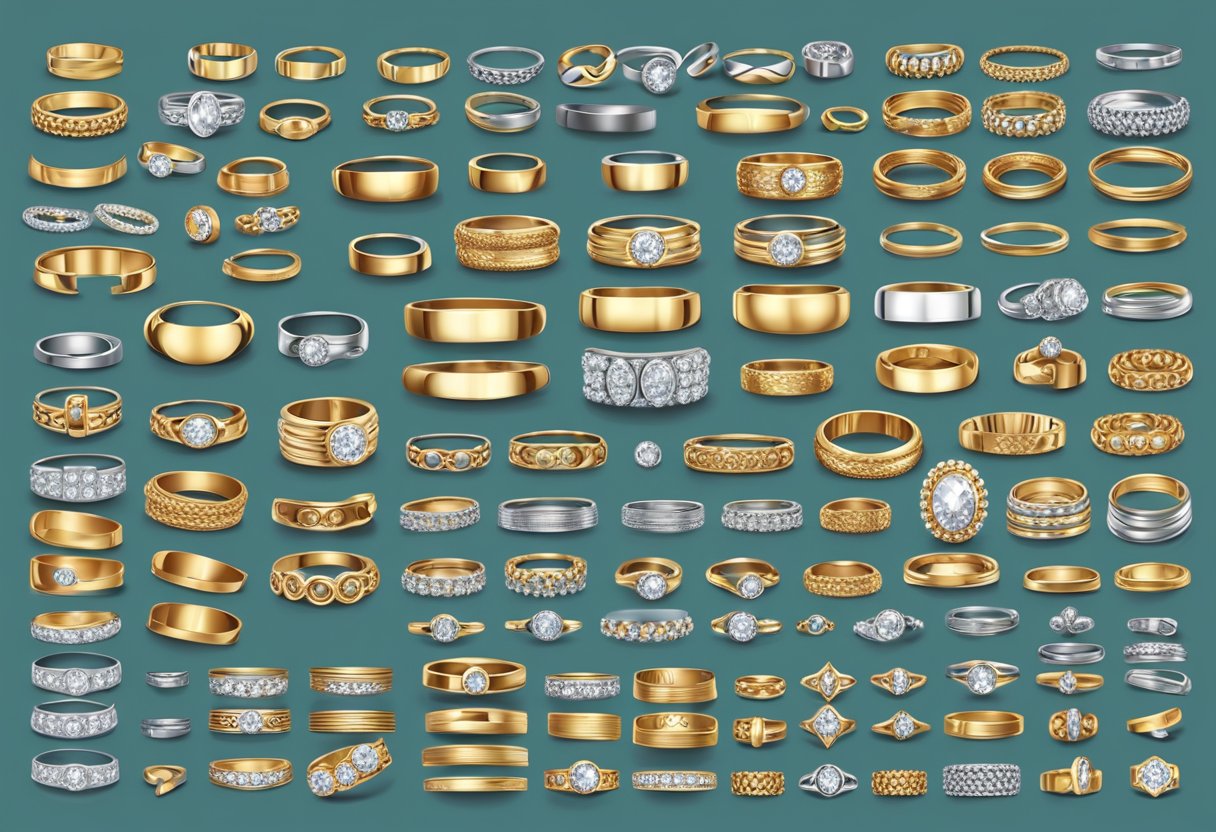
Selecting the correct wedding band metal is crucial to ensure durability and lasting quality. It's important to understand metal alloys, how the karat system affects quality, and the composition's role in a band's resilience.
Understanding Alloys
Wedding bands are typically not made of pure metals but are often alloys—mixtures of a primary metal with other elements to improve its properties. For instance, gold when combined with copper or silver, becomes sturdier; these additions are essential for a ring that can withstand daily wear without serious deformation.
- Gold Alloys: Often mixed with metals like copper to enhance hardness.
- Silver Alloys: Mixed with copper to prevent rapid tarnishing.
Karat System Explained
The karat system measures the purity of gold, with 24K representing pure gold. However, pure gold is too soft for practical use in jewelry, including wedding bands.
- 18K Gold: Contains 75% gold and 25% other metals, offering balance between purity and strength.
- 14K Gold: 58.3% gold, popular for its greater durability.
Impact of Metal Composition on Durability
The blend and proportion of metals in an alloy significantly affect a wedding band's hardness and durability. Bands with a higher percentage of soft metals will be prone to scratches. Alloys like 18K or 14K gold strike a balance, providing sufficient resilience for daily wear while maintaining an attractive sheen.
- Copper: Adds hardness to gold alloys.
- Palladium: Increases durability and maintains a lighter color in the alloy.
When you choose a wedding band's metal, consider these elements to ensure a lasting symbol of your commitment.
Design Elements and Customization
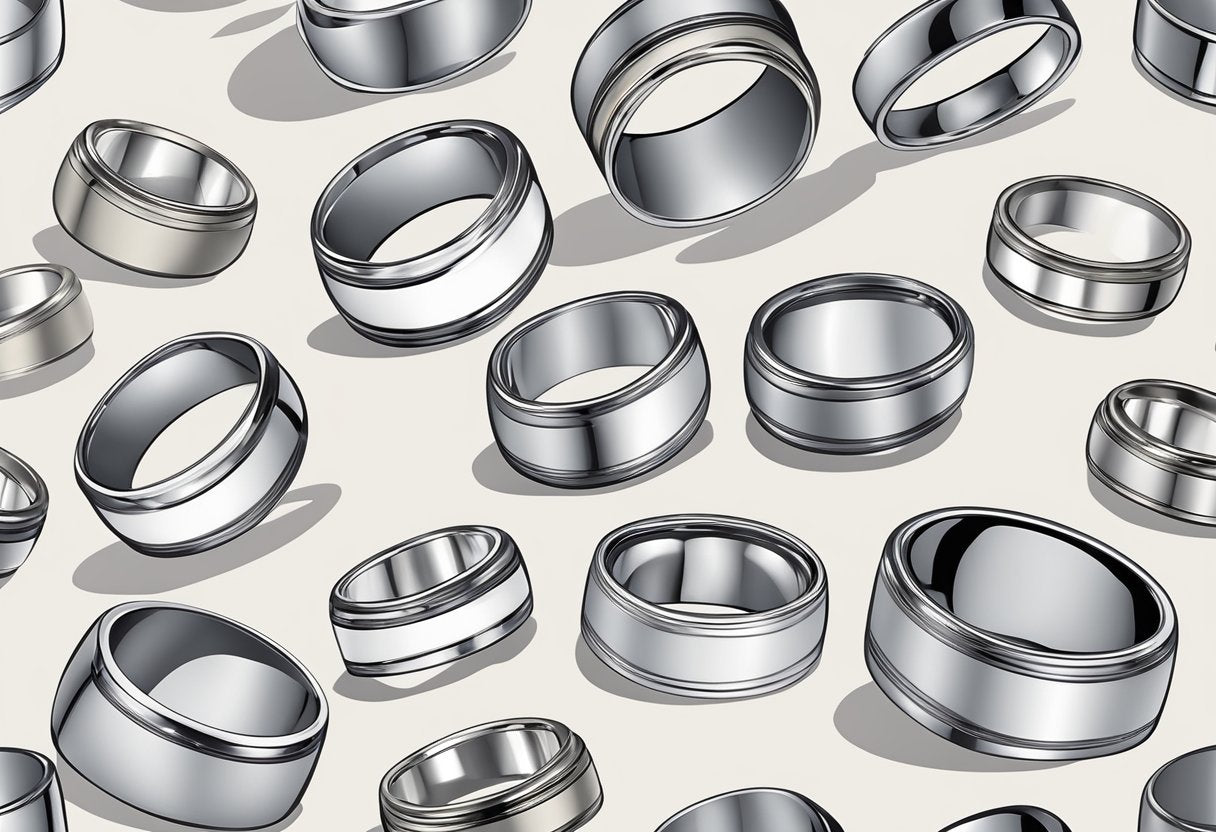
When selecting the perfect wedding band, understanding the interplay between design elements and customization options is crucial. Your choices will not only reflect your style but also symbolize your unique bond. Each metal brings its aesthetic and physical properties to the table, giving you a diverse palette for personalization.
Modern vs Traditional Styles
- Preference for sleek, minimalistic designs.
- High demand for non-traditional metals such as titanium or tungsten.
- Often exhibit a matte finish or include unexpected materials like carbon fiber.
Traditional Styles:
- Timeless appeal of gold (yellow, white, or rose) and platinum.
- Classic designs usually feature a high polish or incorporate rhodium plating for luster.
- Often selected for their ability to be resized and repaired easily.
Unique and Custom Design Choices
- Unleash creativity with parametric design techniques—custom-designed wedding rings allow for intricate and personalized patterns or textures.
- Unique designs may blend different metals or add colored gemstones for eye-catching contrast. For creative wedding band ideas, visit redwoodrings.com .
- Unique designs may blend different metals or add colored gemstones for eye-catching contrast.
- Additive manufacturing or 3D printing opens up possibilities for customized artistic designs in metals like gold or silver.
Engagement Ring Pairing
- Pairing with an engagement ring: Aim for cohesion between the engagement ring and the wedding band. The metals should complement each other, and the designs should align in style.
- Consider whether you want the wedding band to stand out or to create a seamless look with the engagement ring.
- If the engagement ring is a unique design, it may require a custom-fitted wedding band to match its contours.
Wear and Maintenance of Wedding Bands
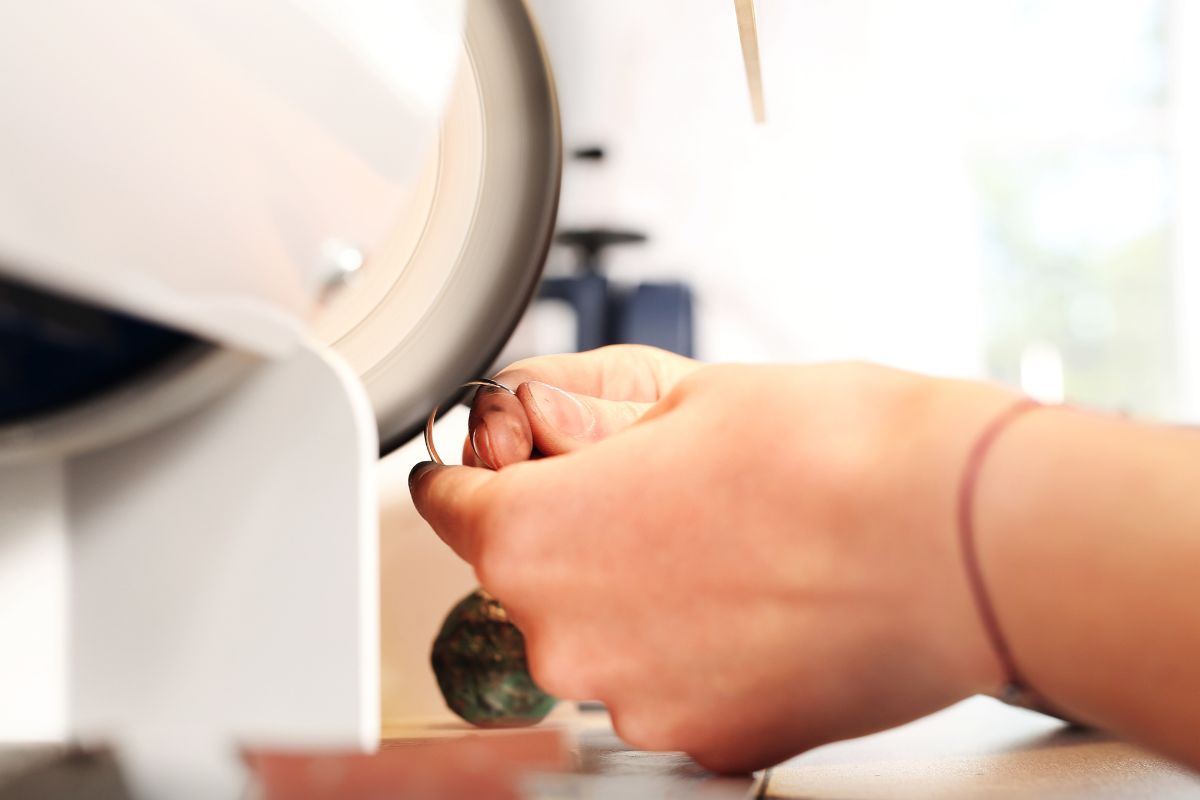
Maintaining your wedding band is integral to ensuring it lasts a lifetime. Dealing with daily wear and scratches, preserving its long-term beauty, and understanding resizing and adjustments are all key to wedding band care.
Dealing with Scratches and Wear
Tungsten is highly resistant to scratches and wear and tear, making it a robust choice for wedding bands. However, in the event your tungsten band does show marks, maintenance typically involves a simple polish with a non-abrasive cloth. For softer metals that are prone to scratches, such as gold, consider occasional buffing by a professional to maintain the band’s luster.
- Expert Tip: For gold bands, getting a rhodium plate every few years can help protect against scratches and restore shine.
Long-term Preservation
Daily activities can expose your wedding band to substances that cause tarnishing. For silver bands, store in a cool, dry place and clean with a silver polish cloth regularly. With gold or platinum, avoid exposure to harsh chemicals and clean with a solution of mild soap and warm water.
- Maintenance:
- Silver: Polish regularly; store away from humidity.
- Gold/Platinum: Gentle soap wash; avoid chemicals.
Resizing and Adjustments
If your wedding band needs resizing, seek a professional jeweler who has experience with the specific metal of your band. Metals like tungsten are too brittle to be resized, so correct sizing at purchase is crucial. For gold or platinum bands, resizing is more straightforward and can usually be done without compromising the integrity of the ring.
- Preparing for Resizing:
- Verify the material of your band.
- Choose a reputable jeweler familiar with the metal.
- Discuss the possibility of future adjustments before finalizing the band's design.
By following these steps, you can ensure that your wedding band remains a fitting symbol of your commitment over the years.
Advantages and Drawbacks of Each Metal
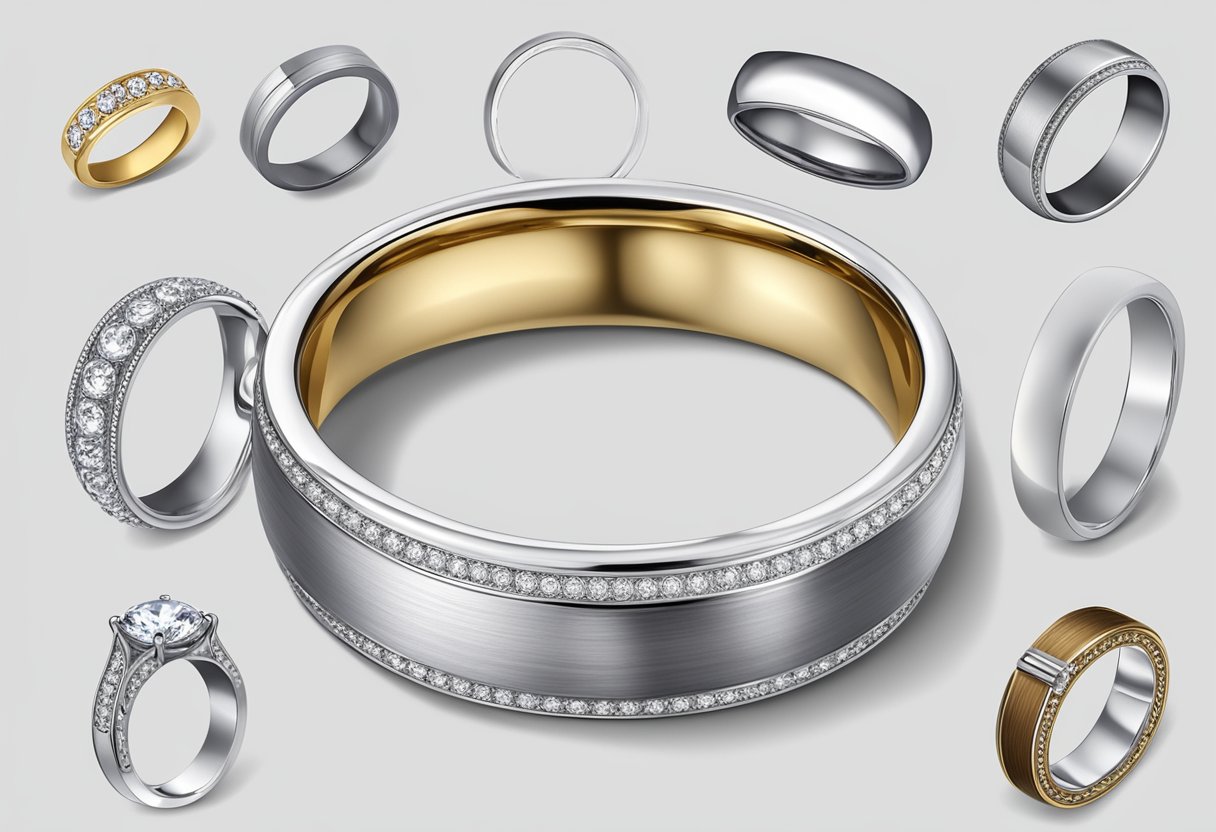
When selecting a wedding band, you should consider various metals, each offering unique benefits and limitations. Your decision should factor in durability, aesthetic appeal, potential allergies, and maintenance requirements.
Considering Durability and Wear
Stainless steel is known for its robustness; it's highly scratch-resistant and withstands daily wear well, making it a practical choice for wedding bands. However, it's not as malleable as other metals, meaning it's harder to resize. On the other hand, ceramic bands are durable but more brittle and can shatter upon impact.
Assessing the Beauty and Shine
Metals like platinum and white gold offer a beautiful shine and maintain their luster over time; however, platinum can develop a patina that may dull its initial shine. Titanium has an appealing, modern look but is difficult to engrave due to its hardness.
Allergies and Skin Sensitivity Concerns
If you have sensitive skin, hypoallergenic options like platinum or titanium may be best for you, as they are less likely to cause reactions. Stainless steel, while generally safe, might contain trace amounts of nickel, which could be problematic for some.
Pros and Cons Summary
Stainless steel is affordable and durable but may not have the prestige of gold or platinum. Ceramic offers a unique look with excellent scratch resistance but can break if dropped. Take into account your lifestyle, aesthetics, and potential allergies to ensure you choose the best wedding band metal for your needs.
- Pros: Lower cost, durable, hypoallergenic options available.
- Cons: Less traditional appearance, varying degrees of scratch-resistance, potential brittleness with ceramic.
Special Considerations for Men's Wedding Bands
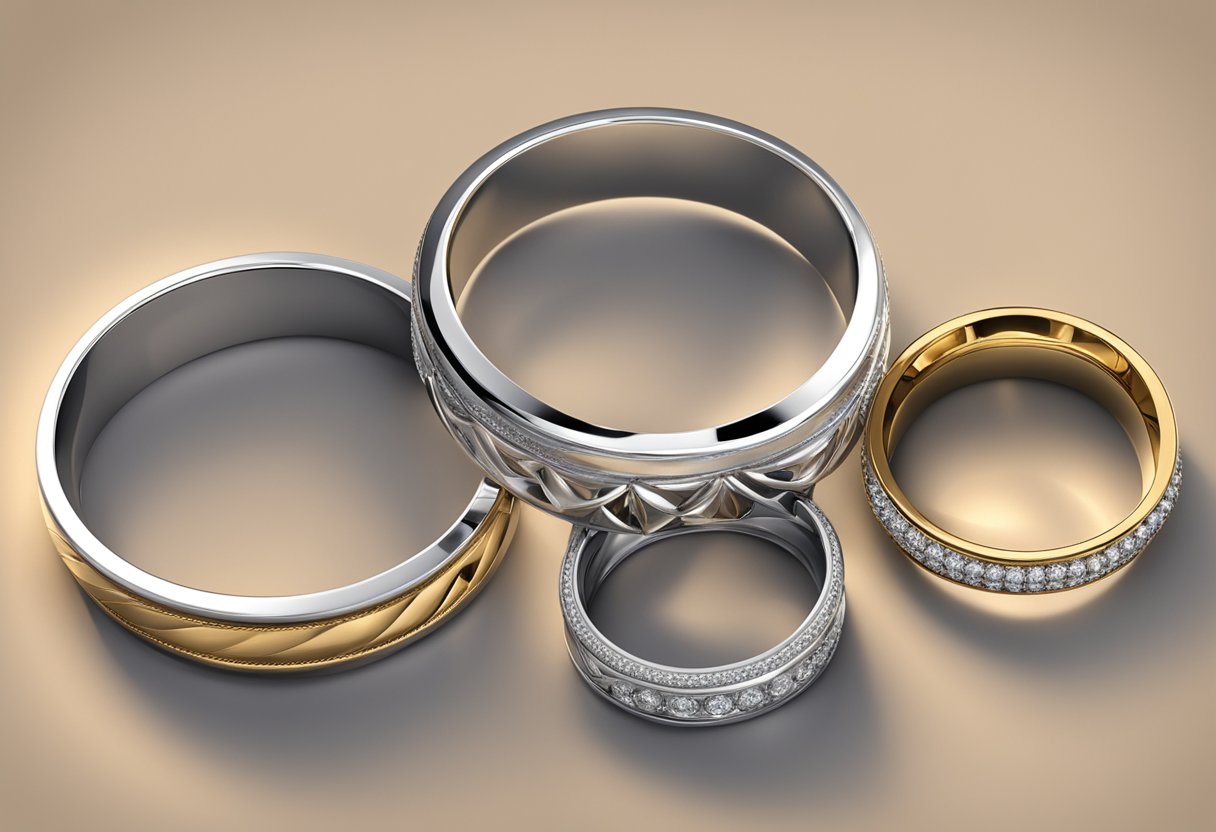
When selecting your men's wedding band, consider how both design and material align with durability and comfort, ensuring the ring stands up to daily wear while echoing your personal style.
Masculine Design Preferences
The design of men's wedding bands often leans towards a more masculine aesthetic. Simplistic and bold features are common—flat bands, squared edges, and minimal embellishments cater to this preference. You might gravitate towards rings with a brushed or matte finish for a subtler appearance, or opt for grooves and inlays if you prefer a touch of distinction without excess.
Material Choices for Men's Bands
The materials you choose impact not only the appearance of your wedding band but also its comfort and longevity.
-
Gold: Undertones can range from cool to warm, suiting different skin tones. Typical karats for men's bands are 14K and 18K, with higher karat gold being softer and less durable.
-
Platinum: Known for its heft and durability, platinum is hypoallergenic and maintains its luster without much maintenance. It develops a patina over time, which can be polished if you prefer a shiny finish.
-
Tungsten: Exceptionally durable and scratch-resistant, tungsten's weighty feel may appeal to men seeking a solid, substantial ring. However, it can be brittle and might crack under extreme pressure.
-
Titanium: This metal is lightweight, strong, and corrosion-resistant, making it a practical choice for men who aren't used to wearing jewelry daily.
-
Stainless Steel: For a budget-friendly option, stainless steel is durable and can mimic the appearance of white gold or platinum.
-
Silicone: An outlying option, silicone bands offer unparalleled comfort and flexibility for active lifestyles or those working with their hands. They are unlikely to cause injury since the material can easily break away under stress.
Each material brings a unique balance of attributes, so weigh your preferences for durability against the statement you want your ring to make. Comfort is paramount for something you will wear daily, so be sure to try on various fits and sizes to find what feels best on your hand.
Unique and Novel Metals
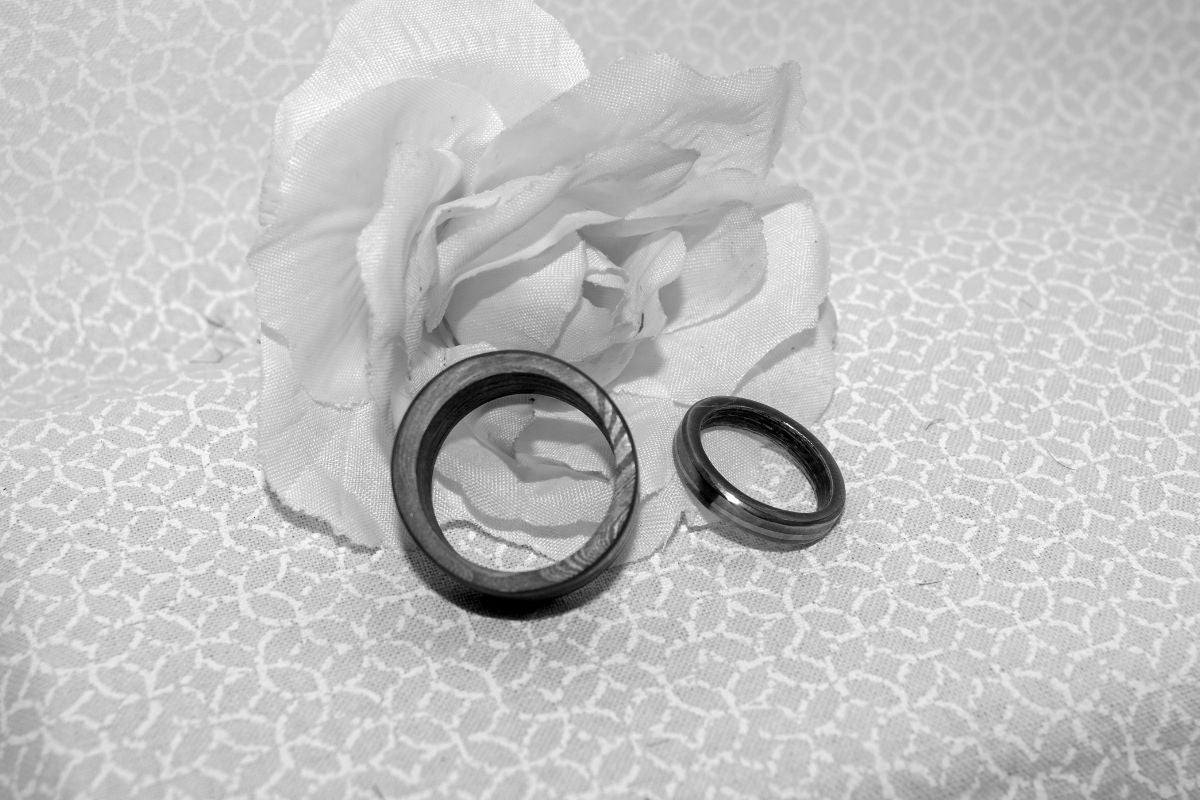
When choosing a wedding band, you may consider stepping away from traditional materials in favor of unique and novel metals. These alternative options can offer distinct advantages and an uncommon aesthetic that reflects your personal style.
Exploring Exotic Materials
Meteorite Rings: Meteorite material has found its way into the jewelry industry, bringing with it a slice of cosmic history. Each meteorite ring displays a one-of-a-kind Widmanstätten pattern, a testimony to its extraterrestrial origin. The use of meteorite symbolizes a love that is literally out of this world, and it's a strong conversation starter due to its uniqueness.
Pros and Cons of Rare Metals
Tantalum is prized for its durability and hypoallergenic qualities. It's highly resistant to corrosion and can be a sophisticated choice for those who are looking for something different without compromising on strength.
On the other hand, while tungsten carbide is one of the toughest materials available for wedding bands, it is also quite brittle and can crack under severe pressure. It's excellent for those who work with their hands but take caution with high-impact activities.
With meteorite rings, while the patterns are incredibly distinctive, meteorite requires more care to prevent rust and maintain its appearance compared to other more common metals. Your wedding band can be a testament to endurance and unique beauty if maintained properly.
When considering these alternative options, it's important to weigh both the aesthetic appeal and practical considerations to ensure that your wedding band is both a symbol of your commitment and a reflection of your individuality.
Jeweler and Purchasing Advice
When selecting the best metal for your wedding band, it's crucial to work with a reputable jeweler and make your purchase with a keen understanding of the materials and their long-term value.
Selecting a Reputable Jeweler
To ensure you get the best quality and service, start by researching jewelers who specialize in wedding bands. Look for established businesses with positive reviews and a solid reputation in the industry. Verify their credentials and whether they are members of professional organizations, such as the Jewelers of America or the Gemological Institute of America. A trustworthy jeweler will be transparent about their products' sources and the quality of their metals.
Insights for a Mindful Purchase
When purchasing a wedding band, consider the durability and maintenance required for different metals. For instance, platinum is known for its strength and longevity, making it a premium choice for wedding bands. Yet, it can be more expensive compared to other metals like gold or silver. Additionally, think about lifestyle and how often the ring will be worn. If you're active or work with your hands, you might prefer a scratch-resistant metal like tungsten. Remember that with wedding bands, you're not just buying a piece of jewelry; you're investing in a symbol of your commitment. Therefore, opt for quality and longevity over trends or price.
Also Read
Frequently Asked Questions
When selecting the metal for your wedding band, it's crucial to consider longevity, style, potential allergies, and your lifestyle. This section addresses common queries to assist in making an informed choice.
What are the most durable metals for women's wedding bands?
Platinum is one of the most durable and purest metals, making it a top choice for women's wedding bands. It resists scratches and maintains its luster well over time.
What material is recommended for men's wedding bands that balances durability and style?
For men's wedding bands, palladium offers a good balance between durability and a sleek, modern style. It's lighter than platinum but shares similar properties of strength and color.
What is the best ring material for those with active or manual jobs?
For those with active or manual jobs, tungsten carbide is an ideal ring material due to its extreme hardness and scratch resistance.
Which metal for a wedding ring offers the best resistance to tarnishing?
Gold, especially 18k and higher, offers excellent resistance to tarnishing, maintaining its sheen without the need for frequent polishing.
In comparing tungsten and titanium wedding bands, which offers greater benefits?
Tungsten typically has greater scratch resistance and a heavier feel, which some find more desirable. However, titanium is hypoallergenic and lighter, which might be beneficial for those sensitive to other metals.
What considerations should be taken into account when choosing the metal for an engagement ring?
Think about the ring's longevity, any potential allergenic reactions, daily activities that could affect the ring, and, of course, aesthetic preferences. Metals like platinum and white gold are popular for their durability and elegance.
Checkout some of our top collections:
Leave a comment
Please note, comments must be approved before they are published.
